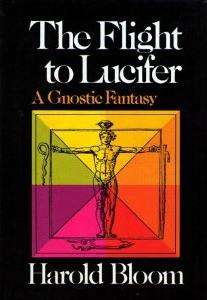The Flight to Lucifer
 Cover of the first edition, showing jacket illustration of the Primal Man from De Occulta Philosophia by Cornelius Agrippa | |
| Author | Harold Bloom |
|---|---|
| Country | United States |
| Language | English |
| Genre | Fantasy novel |
| Published | 1979 (Farrar, Straus and Giroux) |
| Media type | Print (hardcover and paperback) |
| Pages | 240 |
| ISBN | 0-374-156441 |
The Flight to Lucifer is a 1979 book by the American literary critic Harold Bloom. His only novel, it was composed as a sequel to the David Lindsay 1920 novel A Voyage to Arcturus, which supplied the concept of a voyage through space to a distant planet created by a demiurge, and a few other incidental features of the book. However, most of its content derives fairly directly from Gnosticism, which Bloom had studied.
Bloom has stated that he does not like the novel and has disowned it, although it has received very positive reviews from other sources.
Relationship to Lindsay's novel
In Lindsay's novel, two men, the passionate giant Maskull and the thin, intense Nightspore, are taken from Earth to the planet Tormance by Krag, a mysterious figure who is a residue of the true godhead, Muspel, unassimilated by the false creations of Tormance's demiurge, Crystalman. Bloom's novel reproduces this formula, but with names drawn directly from the history and cosmology of Gnosticism. Maskull becomes Thomas Perscors ("through fire"), and is explicitly identified as an incarnation of Primal Man. Nightspore's correlate is Seth Valentinus, a reincarnation of the gnostic theologian Valentinus. Their guide is Olam, who is an Aeon, an emanation of the true god. The planet Lucifer is controlled by "Saklas", which is a Gnostic name for the false creator.
Olam has brought Perscors to Lucifer to fight Saklas, and has brought Valentinus so he can remember his true self; this is also drawn from Lindsay. However, the details of their adventures are quite different, and in the end Perscors cripples Saklas and changes the order of things across all of Lucifer, whereas Nightspore's victory is merely to escape the clutches of Crystalman and see reality as it is, though he vows to return to the world and free others.